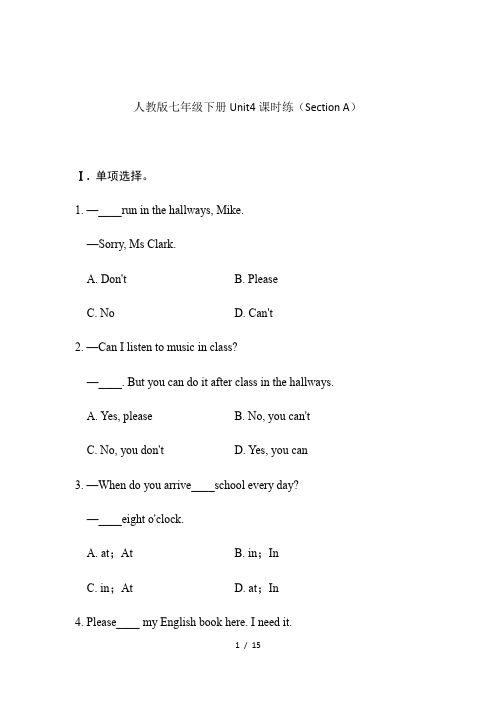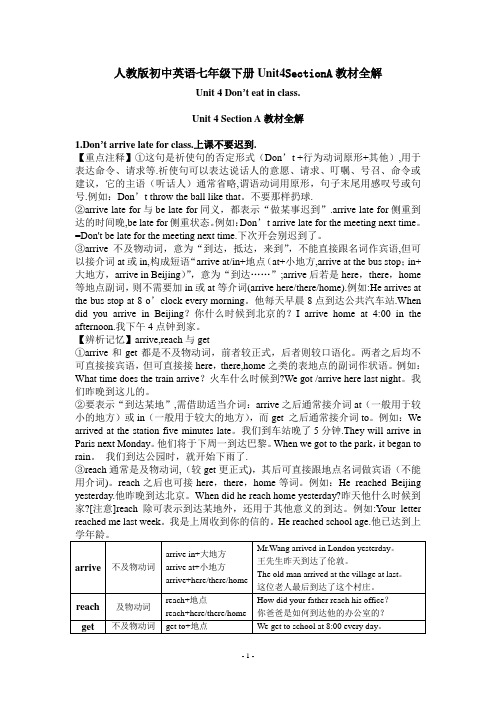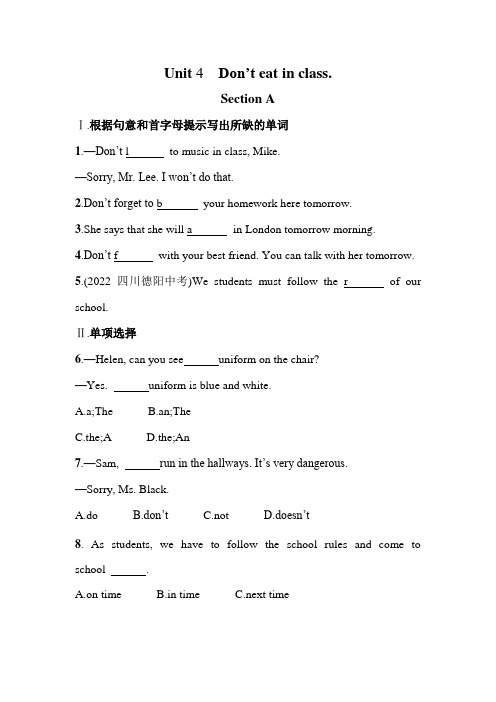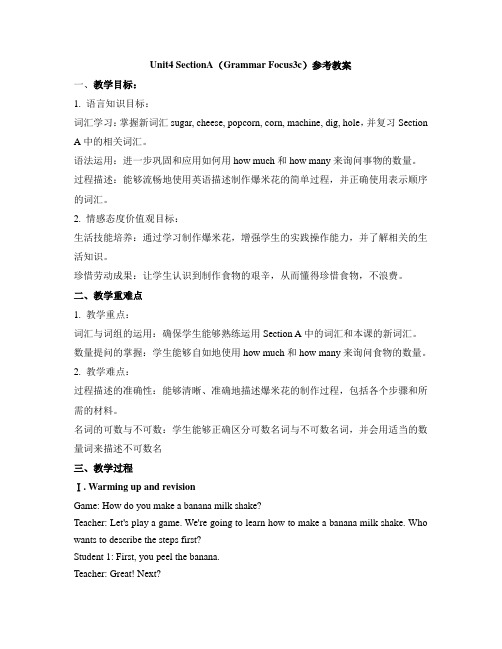初中英语人教版七年级下册Unit 4 Section A
人教版七年级英语下册导学案-Unit 4 Don't eat in class

Unit 4 Don’t eat in class .第1课时Section A 新授课导学案【预习指导】一、扫清障碍根据音标读出19到21页的单词,能初步记忆单词。
二、课本预习:熟读课本19 到21页, 划出重要的新短语,新句型。
三、预习效果检查。
1.在外面________2.穿,戴________3.重要的________4.带来________5.校服________6.安静的________7.规则8 。
到达________9.走廊________ 10 。
大厅________ 11.餐厅________ 12.听________ 13. 打架_________ 14.抱歉的,难过的________1.听音乐_________________2.在音乐教室里_________________3.在外面吃东西_________________4.戴帽子_________________5.很多规则_________________6.…中的一些_________________7.拿来,带来_________________ 8.音乐播放器_________________9.不得不,必须_________________ 10.保持安静_________________11.图书馆规则_________________ 12.在我梦想中的学校_________________ 13.上课迟到14.准时15.在走廊里_________________ 16. 在餐厅里_________________17.在教室里_________________ 18.在图书馆_________________19.在课堂上_________________ 20.穿校服_________________【知识点拨】1. arrive late for= be late for 做某事迟到。
Don’t arrive late for the meeting next time 下次开会别迟到2、语法(祈使句)祈使句是用来表示请求、命令、叮嘱、号召或者劝告等的句子,这类句子的主语常是第二人称you,也就是听话者,因而you常省去了。
2019人教版七年级英语下册Unit4_Don't_eat_in_class课件PPT(年春)教育物理

Don’t talk in class.
Don’t talk with each other in class. Stop talking in class.
Don’t play cards in school.
Don’t smoke .It’s bad for your health.
Don’t sleep in class.
Don’t fight. We can’t fight with others.
Grammar
1. 祈使句是表示请求、命令、叮嘱、号召、 劝告等的句子; 通常省略主语you; 句中谓语 动词用动词原形; 句尾一般用降调; 祈使句的
开头是动词原形。
祈使句有肯定和否定两种: e.g. Look out! 小心!
Don’t wear hats in class. Don’t dance in the classroom.
Wear a uniform.
Don’t listen to music in the classroom.
Listen to music in the music room.
Homework
Can we eat in class? No, we can’t.
Don’t eat in the classroom.
arrive late for class Can we arrive late for class? No, we can’t.
Don’t arrive late for class.
• Think about the family rules.
FAMILY RULES
Don’t talk loudly on the phone.
人教版七年级下册 英语 Unit 4 Section A 基础 练习

人教版七下英语 Unit 4 Don_t eat in class. Section A 基础一、单项选择(共7小题;共14分)1. —Tom, can you _____ your English dictionary to school tomorrow? We'll use it.—OK, Mr. Smith. I'll do it.A.takeB.carryC.bringD.get2. —Excuse me, will the flight arrive soon?—Yes, it will be landing right _____.A.at timesB.in timeC.on time3. Do you have lots of _____ to follow in your school?A.friendsB.questionsC.rulesD.dreams4. —The meeting is very _____, so you must get everything ready and can't be late.—OK. I will get there early.A.realB.importantC.strictD.terrible5. I want to _____ a song, but I _____ a lot of noise.A.listen to; listen toB.listen to; hearC.hear; hearD.hear; listen to6. —Tom, _____ here to carry the luggage upstairs for me, will you?—All right.eB.cameingD.to come7. —Mum, may I play computer games this evening?—No way, you _____ finish your homework.A.canB.mustC.mayD.will二、句子填空(共10小题;共20分)8. Our teacher asks us not to run in the _____ (大厅) because it is a quiet place.9. I'm _____ (抱歉的). I am late for class again.10. It's very cold _____ (在外面). Don't go out.11. —Don't l_____ to music in class, Mike.—Sorry, Mr. Lee. I won't do that.12. Don't forget to b_____ your homework here tomorrow.13. She says that she will a_____ in London tomorrow morning.14. Our teacher says that it's very i_____ for us to learn English well.15. The pandas are very shy; please be q_____.16. Are there lots of _____ (规则) at your home?17. Look at the man. He always _____ (穿) black T-shirts.三、句型运用(共5小题;共10分)18. Lisa likes running. She likes swimming, too. (改为同义句)Lisa likes running. She _____ likes swimming.19. I have to finish the work today. (改为否定句)I _____ _____ _____ finish the work today.20. Lisa has to arrive there at six o'clock. (改为一般疑问句,并作肯定回答) —_____ Lisa _____ _____ arrive there at six o'clock?一Yes, _____ _____.21. They have to get up before 6:10 every morning. (对画线部分提问)_____ _____ they _____ _____ _____ before 6:10 every morning?22. You can't park your car here. (改为祈使句)_____ _____ your car here.四、汉译英(共5小题;共10分)23. 不要在教室里吃东西。
2020年人教版七年级英语下册Unit4课时练(SectionA)(有答案)

人教版七年级下册Unit4课时练(Section A)Ⅰ. 单项选择。
1. —____run in the hallways, Mike.—Sorry, Ms Clark.A. Don'tB. PleaseC. NoD. Can't2. —Can I listen to music in class?—____. But you can do it after class in the hallways.A. Yes, pleaseB. No, you can'tC. No, you don'tD. Yes, you can3. —When do you arrive____school every day?—____eight o'clock.A. at;AtB. in;InC. in;AtD. at;In4. Please____ my English book here. I need it.A. takeB. bringC. to takeD. to bring5. His brother____to go to school today. Because it's Saturday.A. doesn't haveB. don't haveC. doesn't hasD. can't have6. —Excuse me, Maria. Can I use your bike?—Sure. Here you are. But you must return it ________ time.A. inB. atC. onD. to7. —It's far from the train station. How do you ________ there?—I take the subway.A. arrive atB. arrive toC. arriveD. arrive in8. Don't ________ late for class. It's one of the school ________.A. /; rulesB. is; rulesC. /; ruleD. be; rules9. Hey, Jim! ________ leave your soccer ball in the sports club.A. NotB. Don'tC. NoD. Doesn't10. There _______ some rules in school, and we have to _______ them.A. is; listen toB. are; listenC. are; followD. has ; follows11. There are lots of ________ that students have to follow in school.A. exercisesB. problemsC. skillsD. rules12. The train usually ________ Shanghai at 11:20 a. m. Let's ________the bus station before that.A. arrives in; get toB. arrives to; getC. get; arriveD. get to; arrive13. —May I ________ music in the classroom?—No, you can't. ________ you can't do it in the hallways, either.A. listen; OrB. listen to; OrC. listen; AndD. listen to; And14. ________ listen to music in the classroom.—Sorry, I won't do it again.A. NotB. NoC. DoD. Don't15. ________ a bike to work is good for health.A. RideB. RidingC. TakeD. Takes16. —Why can't Nancy come to your party?—Because she ________ do her homework.A. canB. can'tC. has toD. doesn't have to17. —Look, the lady in red ________ be our English teacher.—No, she ________ be. She is in the office now.A. must; can'tB. can; mustn'tC. may; mustn'tD. shall; can't18. —Mum, may I go swimming now?—Yes, dear, but remember that you ________ go with your dad.A. mayB. canC. must19. Nancy can't go to the movies with us because she ____do herhomework.A. has toB. canC. doesn't have toD. can't20. —Do you have to run every morning?—Yes, I____.A. doB. canC. mayD. need二、根据句意及首字母提示填写单词21. We keep quiet in the h________ and in the library.22. —Can you b________ your family photos to school tomorrow?—Yes, I can.23. I'm s________ I can't finish my homework today.24. He loves sports, so he always w________ sports shoes.25. We usually eat lunch in the dining h________ at twelve.26. Mike never f________ with his brother about small things.27. It's very i________ for a student to keep healthy.28. There are some r________ in the library, such as “No talking”.29. I'm s________ that I can't come to your home for your birthday partytoday.30. We can see some fruit, eggs and hamburgers on the d________ table.三、用所给词的适当形式填空31. Sam's brother plays basketball very well. He is a good basketball ________(play).32. Don't ________ (be) late for school next time.33. The students have to ________ (listen) to their teacher in class.34. It's Monday today. It's my ________(one) day of the weekday.35. After school, she teaches me ________(play) the piano every day.36. ______(not be) late for class.37. He ______(have) to read English every morning.38. Do you have to ______(wear) school uniforms every day?39. Tony ______(not have) to go to school every day.40. Please ______(be) quiet in the library.四、根据汉语意思完成句子41. 有许多男孩可以做的事情。
人教版七年级英语下册 Unit 4 基础练习卷附答案

Unit4 SectionA一、单选题1.—Don't make so much noise in class, Jack!—________.A.Yes, I do B.I like C.Sorry, I won’t D.Yes, I will 2.________ be late ________ school.A.Don't; to B.Don't; for C.Can't; to D.Can't; for 3.Don't run or listen to music ________ the hallways.A.on B.in C.with D.for 4.Students can't eat in the classroom. And they can't fight there,________.A.too B.also C.either D.always5.I am late ________ school today. 1 must get up early and get to school ________ time tomorrow.A.for; in B.with; in C.for; on D.with; on 6.—Can I sing here? —No, you can't. But you can ________ music here. A.think of B.listen to C.ask for D.help with7.—Don't eat in the classroom!—________.A.Thanks a lot B.That sounds boring C.You are welcome D.Sorry, Miss Li8.Jim, __________ play basketball in the street.A.doesn't B.don't C.can't D.isn't 9.—Jack, could you please not __________ your iPad to school?—OK, Miss Smith. I won't next time.A.forget B.leave C.take D.bring 10.We can arrive__________the station at five o'clock.A.at B.on C.in D.for 11.—Do you have to stay at home?—__________. It's dangerous for little girls to go out at night. A.Yes,we do B.No,we don't C.Yes,we have D.No,we haven't to12.—Can I listen to music here?—__________. But you can listen to music in the hallways.A.Yes, please B.No, you can't C.No, you don't D.Yes, you can 13.You __________ take me to the station. My brother's taking me. A.can't B.must C.can D.don't have to 14.—Where are your classmates?—It's lunchtime. They're in the __________.A.library B.classroom C.music room D.dining hall 15.—Can we wear jeans at the party? —________.A.Yes, we do B.No, we don't C.No, we can't D.Yes, we can't 16.—Can I use your ruler? —Yes, you ________.A.may B.need C.can D.must 17.—________ do you have to do after school? —Do my homework, of course.A.What B.When C.Where D.How 18.Alice, I'm ________. I lost your book.A.afraid B.sorry C.busy D.true 19.Little Mary is often late ________ school.A.with B.to C.for D.in20.(2017 • 上海中考)Shirley is still waiting for her flight to New York City ______________ the airport.A.at B.under C.on D.with21.-Please don't throw paper on the ground.- _________, I won’t.A.Excuse me B.That's all rightC.Sorry D.It doesn't matter 22.(2017年山东德州)As soon as I heard the news that I passed the driving test, I felt _____ at once.A.angry B.relaxed C.afraid D.nervous 23.You __ drive your car so fast. It's very dangerous.A.wouldn't B.shouldn't C.couldn't D.mightn't二、完型填空Hello, everyone! Welcome to Class 2. I'm your English teacher. Now let 24 tell you our class 25 First, you can't be26 class. You must arrive 27 time. Second, you must bring your textbooks and notebooks to every lesson. Third, you must28 English during(在……期间)the pair work activities. If it's29 for you, you can ask me 30 help. Fourth, you must use green pens to correct(改正)your exercises. You mustn't use red 31 . Fifth, if you have any 32 , you must put up your hands. You can't talk or stand up without permission(允许). These are all the rules. They are good for you, 33 you must follow them. I hope we can have a good time every day.24.A.her B.me C.them D.us 25.A.time B.homework C.stories D.rules 26.A.late for B.good for C.good with D.busy with 27.A.of B.at C.for D.on 28.A.tell B.say C.speak D.talk 29.A.easy B.difficult C.long D.short 30.A.about B.for C.from D.of 31.A.pens B.rulers C.erasers D.books 32.A.exercises B.questions C.dreamsD.habits33.A.but B.after C.so D.orWe can see many traffic signs(交通标志)on both sides of the roads.Some 34 the drivers 35 to do,and others tell them what not to do.The traffic signs are the traffic rules. 36 people must obey the rules and mustn't break them.Each traffic sign 37 its meaning.Do you 38 the sign “P”?Do you know its meaning?In big cities,there are 39 cars,trucks and buses.They can't stop on the streets 40 any time.If a driver wants to stop his car,he must 41 a place for his car—a car stop.A car stop42 a special “hotel” and it's for cars to live in.“P” is the first letter of the word “Park(停车)” and it means “You can stop your car here!”43 important to obey the traffic rules.34.A.say B.tell C.talk D.speak 35.A.that B.what C.why D.how 36.A.All B.Some C.Many D.Lots of 37.A.have B.has C.had D.have to 38.A.watch B.spell C.see D.talk 39.A.too much B.too many C.a lot D.lot of40.A.at B.in C.on D.for41.A.look at B.look like C.look up D.find 42.A.like B.is like C.likes D.has 43.A.That B.It C.That's D.It's三、阅读单选Sun Library·Opening time:9:00 a.m.~5:00 p.m. Sunday to Friday ·Science books Section A·English books Section B·Storybooks Section C·History books Section DHere are some rules for the readers:·Don't take your bag into the library.·Don't talk or listen to music in the library.·No food in the library.·Keep the library clean and quiet.44.Mike's mother works in Sun Library.She works for ______ hours a day.A.five B.six C.seven D.eight45.If you want to read books in Sun Library,you can't go on ______. A.Monday B.Wednesday C.Saturday D.Sunday 46.If you want to read some storybooks,you can go to ______. A.Section A B.Section B C.Section C D.Section D 47.What does the underlined word “readers” mean in Chinese? A.作家B.读者C.病人D.游客48.Which of the following is TRUE?A.You can read some history books in Section B.B.You can eat in the library.C.You can listen to music in the library.D.You must be quiet in the library.四、阅读判断There are many rules in my school. We must wear schooluniforms when in school. We have to get to school before seveno’clock in the morning. In class, we mustn’t eat or drink. During the breaks, we mustn’t run in the hallways. But we can listen to music in the hallways. We also can’t leave school until we finish (完成)our homework. I don’t like school. So my favorite days are Saturday and Sunday.How about you?49.The writer can wear what she likes to school.50.The writer has to arrive at school before seven in the morning. 51.Eating in class is allowed(允许).52.Listening to music in the classroom is allowed.53.Students must finish their homework before they leave school.五、根据首字母填空根据句意及首字母提示填写单词。
人教版初中英语七年级下册Unit4SectionA教材全解

人教版初中英语七年级下册Unit4SectionA教材全解Unit 4 Don’t eat in class.Unit 4 Section A教材全解1.Don’t arrive late for class.上课不要迟到.【重点注释】①这句是祈使句的否定形式(Don’t +行为动词原形+其他),用于表达命令、请求等.祈使句可以表达说话人的意愿、请求、叮嘱、号召、命令或建议,它的主语(听话人)通常省略,谓语动词用原形,句子末尾用感叹号或句号.例如:Don’t throw the ball like that。
不要那样扔球.②arrive late for与be late for同义,都表示“做某事迟到”.arrive late for侧重到达的时间晚,be late for侧重状态。
例如:Don’t arrive late for the meeting next time。
=Don't be late for the meeting next time.下次开会别迟到了。
③arrive不及物动词,意为“到达,抵达,来到”,不能直接跟名词作宾语,但可以接介词at或in,构成短语“arrive at/in+地点(at+小地方,arrive at the bus stop;in+大地方,arrive in Beijing)”,意为“到达……”;arrive后若是here,there,home 等地点副词,则不需要加in或at等介词(arrive here/there/home).例如:He arrives at the bus stop at 8 o’clock every morning。
他每天早晨8点到达公共汽车站.When did you arrive in Beijing?你什么时候到北京的?I arrive home at 4:00 in the afternoon.我下午4点钟到家。
人教版英语七年级下册Unit 4 Section A 同步练习

Unit 4Don’t eat in class.Section AⅠ.根据句意和首字母提示写出所缺的单词1.—Don’t l to music in class, Mike.—Sorry, Mr. Lee. I won’t do that.2.Don’t forget to b your homework here tomorrow.3.She says that she will a in London tomorrow morning.4.Don’t f with your best friend. You can talk with her tomorrow.5.(2022四川德阳中考)We students must follow the r of our school.Ⅱ.单项选择6.—Helen, can you see uniform on the chair?—Yes. uniform is blue and white.A.a;TheB.an;TheC.the;AD.the;An7.—Sam, run in the hallways. It’s very dangerous.—Sorry, Ms. Black.A.doB.don’tC.notD.doesn’t8. As students, we have to follow the school rules and come to school .A.on timeB.in timeC.next time9. Please your mask (口罩), or you can’t buy anything in the store.A.dressB.bringC.wearD.leave10. If we see the sign “” in the library, we must be quiet.A B C11.—Can you the village tomorrow with your cousin?—Yes, we can get there in the afternoon.A.getB.arrive inC.arrive atD.reach to12.—Can we mobile phones to school?—No, we can’t. We must listen to the teacher in class.A.takes;carefullyB.bring;carefullyC.borrow;careful13.—Mike, play with your ruler in class.—Oh, I’m sorry.A.don’tB.doesn’tC.not14. My brother’s bike doesn’t work, so he walk to school.A.mustB.need toC.have toD.has to15.—Students in our school are learning traffic (交通) rules.—It’s very to teach them about road safety (安全).A.importantB.friendlyC.dangerousD.funnyⅢ.根据汉语意思和所给的提示词语翻译句子16.不要在教室里吃东西。
Unit4SectionA(Grammar-Focus-3c)教案初中英语七年级下册

Unit4 SectionA(Grammar Focus3c)参考教案一、教学目标:1. 语言知识目标:词汇学习:掌握新词汇sugar, cheese, popcorn, corn, machine, dig, hole,并复习Section A中的相关词汇。
语法运用:进一步巩固和应用如何用how much和how many来询问事物的数量。
过程描述:能够流畅地使用英语描述制作爆米花的简单过程,并正确使用表示顺序的词汇。
2. 情感态度价值观目标:生活技能培养:通过学习制作爆米花,增强学生的实践操作能力,并了解相关的生活知识。
珍惜劳动成果:让学生认识到制作食物的艰辛,从而懂得珍惜食物,不浪费。
二、教学重难点1. 教学重点:词汇与词组的运用:确保学生能够熟练运用Section A中的词汇和本课的新词汇。
数量提问的掌握:学生能够自如地使用how much和how many来询问食物的数量。
2. 教学难点:过程描述的准确性:能够清晰、准确地描述爆米花的制作过程,包括各个步骤和所需的材料。
名词的可数与不可数:学生能够正确区分可数名词与不可数名词,并会用适当的数量词来描述不可数名三、教学过程Ⅰ. Warming up and revisionGame: How do you make a banana milk shake?Teacher: Let's play a game. We're going to learn how to make a banana milk shake. Who wants to describe the steps first?Student 1: First, you peel the banana.Teacher: Great! Next?Student 2: Next, you put the banana into the blender.Teacher: And then?Student 3: Then, you pour the milk into the blender.Teacher: Finally?Student 4: Finally, you turn on the blender and mix it well.Teacher: Very good! Remember to use "first, next, then, finally" correctly when describing processes.How do you make a Russian soup?Teacher: Now, let's try with a different recipe. How do you make a Russian soup? Student 5: First, you heat the water.Teacher: And?Student 6: Next, you add the vegetables and meat.Teacher: Continue...Student 7: Then, you let it boil for a while.Teacher: And finally?Student 8: Finally, you add salt and pepper to taste, and serve it hot.Teacher: Excellent! Remember, using "first, next, then, finally" helps make instructions clear and easy to follow.Ⅱ. Grammar Focus.1. 学生阅读Grammar Focus中的句子,然后做填空练习。
- 1、下载文档前请自行甄别文档内容的完整性,平台不提供额外的编辑、内容补充、找答案等附加服务。
- 2、"仅部分预览"的文档,不可在线预览部分如存在完整性等问题,可反馈申请退款(可完整预览的文档不适用该条件!)。
- 3、如文档侵犯您的权益,请联系客服反馈,我们会尽快为您处理(人工客服工作时间:9:00-18:30)。
Unit 4 Don't eat in class.
Section A (1a-2c)
一、教学目标:
1. 知识目标:
1) 能掌握以下单词:rules, arrive, late, hall, dining hall, listen, listen to, fight, sorry
2) 能掌握以下句型:
① Don't eat in class.
② You must be on time.
③ Eat in the dining hall.
3) 学会用英语表达一些标志的含义。
4) 熟练使用目标语言谈论对某些规章制度(校规、家规等)的看法。
2. 情感态度与价值观目标:
能用英语表达和制定一些简单的规则,理解没有规矩不成方圆;无论是在学校时还是在家庭中以及以后走上社会都应当遵守规则,按规则办事。
二、教学重难点
1. 教学重点:
1) 肯定祈使句是省略掉主语的原形动词开头。
2) 否定祈使句则是在肯定祈使句前加上“don’t”。
3) 情态动词must及have to在用法上的区别。
2. 教学难点:
掌握祈使句的用法,并能听懂、会说一些简单的祈使句。
三、教学过程
Ⅰ. Warming-up and revision
教师进教室后,使用祈使句请学生们完成一系列动作:
Please stand up/ sit down. Close the door, please. Look at me and listen to me.
Don’t open your books. Don’t talk. Let’s begin our class.
学生听教师的指令完成各种动作,教师也可将指令写到黑板上,让学生从视觉上考察祈使句的特点。
Ⅱ. Presentation
教师出示书上1a 的图片,向学生提问。
指着图上奔跑的男孩提问
T:What’s the boy doing? S: He’s running.
T: Where is he running? S: He’s running in the hallways. (板书,教读)
T:Can you run in the hallways? S: No, I can’t.
T: So please don’t run in the hallways. (板书,教读)
(= You can’t run in the hallways.)
学生跟读数遍,明白祈使句和“can”的表达含意。
T:Why is he running in the hallways? S: He’s late.
T: Oh, he’s late for class. (板书,教读)
You can’t arrive late for class. (板书,教书) = Don’t arrive late for class.
Ⅲ. 1a
T: Now, Look at the picture on your textbook. Each of the students is breaking one of these rules. Please finish 1a.
学生看图,完成1a的内容,检查答案并大声朗读校规。
Ⅳ. Listening
1. T: Now let’s listen! What rules are these students breaking? Write the numbers after names?
2. 学生们听录音,完成1b,选出四位学生都违反了哪条校规;听之前,学生要读会英文名。
3. Check the answers.
Ⅴ. Pair work
请两位学生朗读1c部分的句型;要求学生两人一组对话表演,SA扮演外校转来新生,SB 告知本校校规。
(学生可经过讨论,多说出他们想到的校规,不必只限于书上;教师应给予帮助)
Ⅵ. Listening
1. Work on 2a:
First, let's read the sentences in 2a together.
T: Now, let's listen to the recording. Check the activities Alan and Cindy talk about.
Ss listen to the recording and check the activities they hear.
Play the recording again for the Ss to check the answers.
2. Work on 2b:
Make Sure Ss know what they should do.
Listen to the recording again. Can Alan and Cindy do these activities? Circle can or can't above.
3. Check the answers.
Ⅶ. Pair work
1. Suppose you are Alan and your partner is Cindy. Talk about the rules in 2a.
2. Let some students come to the front and act out the conversations.
Ⅷ. Role-play
1. Read the conversation and find some rules in this school?
2. Ss read the conversations and find the answers to this question.
3. Check the answers:
( Don't be late for school. Don't bring music players to school. You always have to wear the school uniform. You have to be quiet in the library. )。
